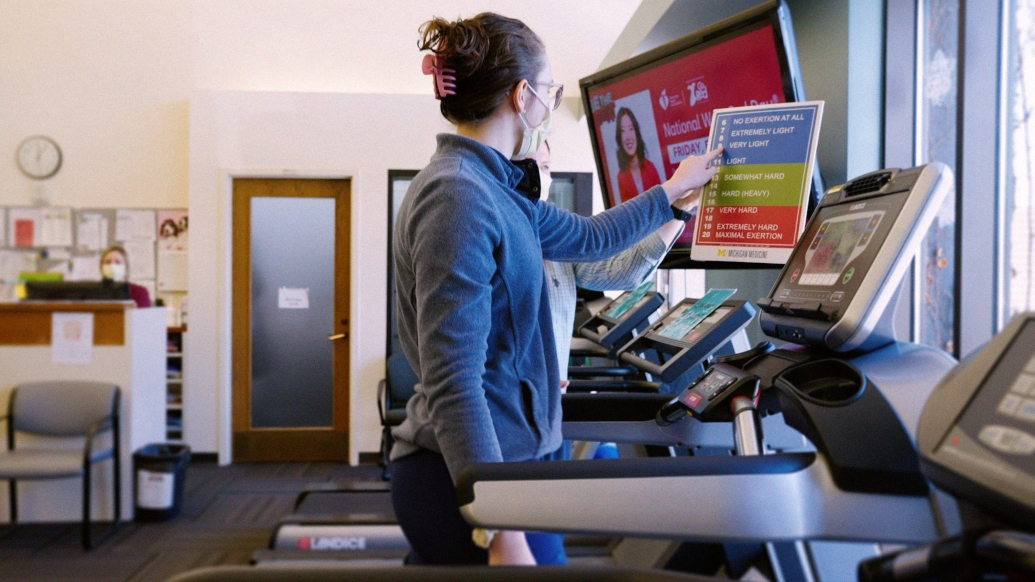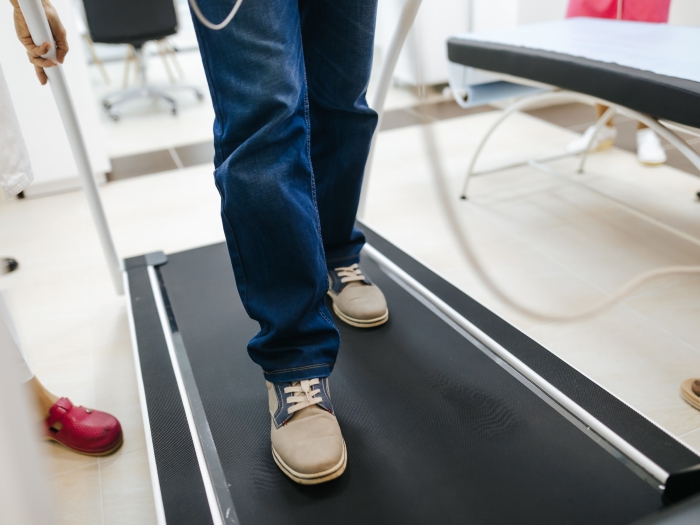Cost of initial cardiac rehab session was the strongest predictor of lower attendance
5:00 AM
Author |

Despite the success cardiac rehabilitation has shown at reducing heart-related deaths and hospital readmissions, higher out-of-pocket costs may prevent patients from participating in the program, a Michigan Medicine study suggests.
In a national study of over 40,000 people with Medicare and commercial insurance, 81.6% of patients did not have to pay for their initial cardiac rehabilitation session.
The medically supervised program lasts up to 36 sessions, which are often recommended for patients recovering from many conditions and procedures.
Among those with insurance coverage that involved sharing the costs of cardiac rehab, patients with higher out-of-pocket costs attended fewer sessions and had lower odds of completing more than 24 sessions.
Results are published in the American Journal of Managed Care.
“Cardiac rehabilitation is a proven method of improving outcomes for patients with recent cardiovascular events, and our results show that lower out-of-pocket costs are associated with increased participation,” said Michael Thompson, Ph.D., co-author of the study and associate professor of cardiac surgery at University of Michigan Medical School.
“In order ensure cardiac rehab is utilized more often by those who need it, the barrier of cost must be addressed.”
Cardiac rehab is recommended as a standard of care for many cardiovascular conditions and procedures, including heart attack, heart bypass surgery, and minimally invasive coronary angioplasty and stenting.
A past U-M study found that people who participate in cardiac rehab have a decreased risk of death years after heart bypass, with those who attended more sessions achieving better outcomes. Another found that the program reduces the risk of hospital readmission by nearly 20%.
In this study, cost for the initial cardiac rehab session was the strongest predictor of lower attendance. For every additional $10 spent out of pocket, patients attended .41 fewer sessions on average.
Researchers note that cost is not the only barrier to participation.
While most cardiac rehab attendees had zero out-of-pocket costs for their first session, participants who paid up to $25 for the initial session — the lowest of those with cost sharing — had higher rates of future attendance than patients who paid nothing.
The group with no out-of-pocket costs, however, may have been less healthy and utilized more health care services, meeting their deductible prior to enrolling in cardiac rehabilitation.
“Out-of-pocket costs are one of many factors associated with adherence to cardiac rehab, and we hope this research spurs further investigations and quality improvement initiatives to improve cardiac rehab by mitigating financial barriers,” said Devraj Sukul, M.D., M.Sc., a cardiologist at U-M Health at the time the research was conducted.
The study results, researchers conclude, support quality improvement initiatives to limit cost sharing hurdles for cardiac rehab services.
Such efforts are promoted by the Million Hearts Cardiac Rehabilitation Change Package, a collaboration between the Centers for Disease Control and Prevention and the American Association of Cardiovascular and Pulmonary Rehabilitation.
“Health care systems must seek ways to offset expenses for cardiac rehab for those who are underinsured, which may improve participation for patients with less comprehensive health plans and reduce disparities in cardiovascular care,” said Alexandra I. Mansour, M.D., resident physician and graduate of U-M Medical School.
“Future payment reform policy should also focus on developing payment models that reduce patient costs for cost-effective interventions such as cardiac rehab."
Additional authors: Ushapoorna Nuliyalu, M.P.H., of University of Michigan and Steven Keteyian, Ph.D., of Henry Ford Health.
Paper cited: “Out-of-Pocket Spending for Cardiac Rehabilitation and Adherence Among US Adults,” American Journal of Managed Care. DOI: 10.37765/ajmc.2024.89637
Sign up for Health Lab newsletters today. Get medical tips from top experts and learn about new scientific discoveries every week.
Sign up for the Health Lab Podcast. Add us wherever you listen to your favorite shows.

Explore a variety of health care news & stories by visiting the Health Lab home page for more articles.

Department of Communication at Michigan Medicine

Associate Professor


Want top health & research news weekly? Sign up for Health Lab’s newsletters today!





